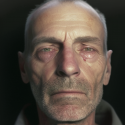I have been following the case for a couple of years and here are a few things I find generally odd or interesting and also a few points regarding other posts in this thread.
My main source is Rosita Boland's work (articles and podcast) as she interviewed all the people directly linked to the case, I do not trust the information on other sites, especially non-Irish ones as there seems to be info missing or lost in translation.
- His clothes and belongings were found neatly folded on a rock, socks in his shoes, etc. the tissues found are "soft & sicher" brand which is sold in the drug store chain DM
For someone who supposedly got rid of everything else, it seems odd he wouldn't have gotten rid of his remaining items if the goal was to vanish in the sea without a trace.
- He was very eager to get the 2.40pm bus despite there being more connections afterward (interview with bus driver at station)
Why was he so eager to get there early if he only planned on walking around? The confirmed sightings begin around 6pm mainly because it was less crowded so people remembered him.
- He didn't pick Rosses Point, he wanted to go to another beach (Strandhill) initially but the cab driver said that one is better for surfing and not ideal for swimming
Basically means Rosses Point had no significant meaning to him.
- Irish police checked facial recognition at UK airports but only for June 2009 which means he either arrived before or not via plane
- I don't think the removed labels are significant, he didn't go out of his way like Jennifer Fairgate (scratched out brand names etc.) to disguise the origin of his clothes. As someone who regularly does it because they bug me, I think people are reading far too much into it.
- His English was described as very good but with a heavy accent, given his age and possible German(ish) heritage that is rather odd because that generation wouldn't really speak English that well unless required for work. Another thing to consider is the Irish accent which can be a problem for people classifying themselves to be fluent in English until they arrive in Ireland. I have seen it time and time again encountering tourists who struggle with it but PB didn't. No communication difficulties were mentioned by anyone he talked to. He had a conversation with the taxi driver who drove him to Rosses Point and in general taxi drivers are notorious for their heavy accents.
I think he could have lived in the north for longer or spend significant time in (Northern) Ireland at some stage.
- The taxi driver said he paid him with a brand new 20 euro note (it must have been in pristine condition for the driver to notice that), Derry bus station has an ATM that also gives out euros but with an added fee, I believe it was already there in 2009 but apparently there is no CCTV, I don't think he withdrew cash in Sligo because it would have been captured by CCTV unless he got the money somewhere else. His remaining cash was found in an envelope and multiple pockets totaling 140 euros so maybe he was given cash in an envelope by someone.
- Gardai/HSE also checked the tumor registry in Europe including NI and UK but nothing was found.
- A copy of the note was shown to Austrian police who would be familiar with different kinds of handwriting I assume (I have seen it mentioned that Irish police may have struggled with cursive or variations of numbers and may have gotten some wrong), it is mentioned they said it was a vacant lot but I believe it is one of those things lost in translation. 1172 is a Vienna postcode, though, basically a post box in a post office to send mail to. I wouldn't read too much into it, I doubt there is a deeper meaning to it.
- Most people described his accent as German, some as Dutch, given the number of tourists especially hotel staff would be quite good at distinguishing different accents. Lots of staff are also from Eastern Europe so most people can easily tell the difference between a German or Eastern accent here, especially hotel staff and cab drivers. It might be harder for regular people but those working with tourists are generally quite good at it.
- I don't think he came to Sligo because of Yeats. There are so many Yeats-related places in Sligo he could have gone to but he didn't (in and slightly outside of town), it would have been captured on CCTV but was never mentioned and this is something gardai would have put out there if they could have found any connection.
- Charity shops, parking garages, private bins, lost and found etc. were checked by Gardai.
- Hotels, restaurants, car rentals etc. in Northern Ireland were checked. Given how many people remembered him in Sligo it would be off that nobody did there. I mean one woman who saw him at the beach even wrote a poem or short story about him because she was so intrigued by his appearance. The only thing Gardai was unable to check were foot passengers from the UK to NI Ferries (I believe there are no records for those). For a while they had 10 people working the case, going through CCTV, passenger lists, and other things. They have been quite thorough.
- A lot of people say he planned everything meticulously but I don't think that is the case, he didn't even choose a hotel before (he asked the taxi driver to take him to a cheap one, the first one was booked up so they tried another one where he ended up staying), considering how much he walked later, it is interesting he took a taxi from the bus station because it is almost right in town and he walks there from the hotel on the day of his departure. I don't think he really knew Sligo and that it was his first time being there.
- I do believe Gardai overestimates how well-known the case is abroad, it has been barely mentioned in German-speaking media.
I am honestly not sure where I stand with this case but I think he came to Sligo to either meet someone or another reason, I don't think it was the town itself or Yeats, and I also don't think he has ever been there before. It is such a small place you would remember even after many years but he didn't seem to know anything, in fact, he was carrying a map when he went in the taxi. I also think he actually wanted to go swimming, he picked a safe and sheltered beach with shallow water instead of the more dangerous one with currents that would have been more likely to take him out to sea. Maybe he was a swimmer earlier in life and wanted to experience it one more time but he also must have known himself he was in no shape to swim out far enough where it would become unsafe and his body was described as not having been in the water for long without signs of saltwater drowning. The way he left his clothes also makes me think he wanted to return them. Maybe he didn't want other people to see him undressing and waited until the beach was empty. The fact he wanted the early bus makes me think he was going to meet someone as he spend hours walking around, sitting on benches etc. Whatever his plan was, I think it didn't actually go to plan. There is also a possibility he didn't know about the cancer, unlikely but not impossible. There are cases when people only find out a few weeks before death due to high pain tolerance for example. He possibly knew his health wasn't great but not that bad if that makes sense. I also can't shake the feeling that there is something sinister about him, he could have been a criminal that was never processed by police but that is just a hunch.
Well that is all I got, I would love to see this case solved at some stage.






